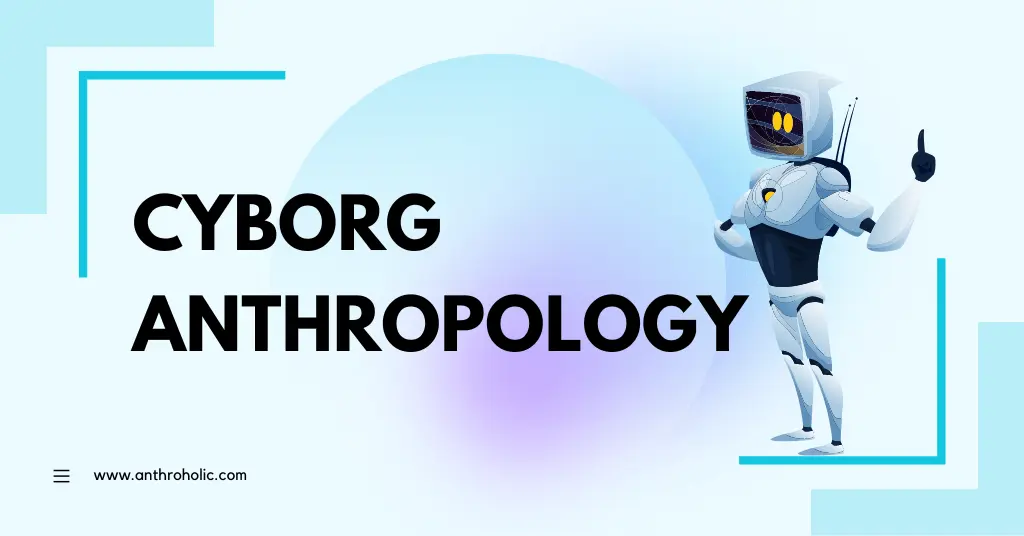AI Answer Evaluation Platform Live Now. Try Free Answer Evaluation Now
Cyborg Anthropology
As technology advances at an unprecedented pace, the line between humans and machines blurs. The concept of a cyborg, or a being that is part human and part machine, is no longer just a sci-fi dream but a reality. This is where cyborg anthropology comes in.

- Introduction to Cyborg Anthropology
- Definition of Cyborg and Cyborg Anthropology
- History of Cyborg Anthropology
- Theoretical Frameworks of Cyborg Anthropology
- The Role of Technology in Redefining Humanity
- The Pros and Cons of a Cyborg Future
- Ethical Considerations in Cyborg Anthropology
- Applications of Cyborg Anthropology
- Cyborg Anthropology in Popular Culture
- Conclusion and Future Implications of Cyborg Anthropology
- See Also
Introduction to Cyborg Anthropology
Cyborg Anthropology is an interdisciplinary field that studies the complex relationship between humans and technology, focusing on the ways in which technology has transformed the human experience. It explores the cultural, social, and psychological impacts of technology on human behavior, identity, and relationships, and seeks to understand how technology and humans are increasingly integrated in a symbiotic relationship. It draws from anthropology, sociology, philosophy, and science and technology studies. Manfred Clynes and Nathan Kline first used the term “cyborg” in 1960 to refer to a fictitious creature that could use technology to improve human capabilities.
Definition of Cyborg and Cyborg Anthropology
A cyborg is a being that combines organic and artificial components, blurring the boundary between nature and culture. It can be a human with a technological implant, such as a pacemaker, or a robot with human-like features, such as Sophia the robot. Cyborg anthropology studies the social and cultural implications of cyborgs, exploring how they challenge our understanding of what it means to be human. It acknowledges that technology is not neutral but embedded in cultural values and power relations.
History of Cyborg Anthropology
Cyborg anthropology emerged in the late 1990s, influenced by the rise of cyberculture and the postmodern critique of the humanist subject. Donna Haraway’s essay “A Cyborg Manifesto” (1985) was a seminal text that challenged the dualistic thinking of nature and culture, male and female, and human and machine. She argued that cyborgs represent a feminist vision of a hybrid, transgressive identity that subverts traditional categories. Other key figures in cyborg anthropology include Amber Case, who coined the term “cyborg anthropology” in 2010, and Stefan Helmreich, who explored the cultural significance of underwater robots in his book “Alien Ocean” (2009).
Theoretical Frameworks of Cyborg Anthropology
Cyborg anthropology draws from various theoretical frameworks, including actor-network theory, posthumanism, and feminist science and technology studies. Actor-network theory emphasizes the agency of non-human actors, such as technologies, in shaping social relations. Posthumanism challenges the humanist assumption of a fixed, universal human nature and acknowledges the diversity of human and non-human entities. Feminist science and technology studies highlight the gendered aspects of technology, exposing the biases and power dynamics that underlie technological development.
The Role of Technology in Redefining Humanity
Technology is not just a tool but a part of our identity and culture. It shapes the way we communicate, work, and relate to each other. Cyborgs represent a new form of identity that challenges traditional categories of gender, race, and ability. They also raise questions about the boundaries between life and death, human and machine, and self and other. Some argue that cyborgs represent a new stage of human evolution, where we merge with technology to enhance our capabilities and overcome our limitations. Others warn that cyborgs can lead to a dystopian future where humans become enslaved to machines or lose their sense of autonomy and authenticity.
The Pros and Cons of a Cyborg Future
The prospect of a cyborg future raises both hopes and fears. On the one hand, cyborgs can improve our health, productivity, and creativity. They can also provide new forms of entertainment and social interaction. For example, prosthetic limbs can enable amputees to perform tasks they could not do before, and brain implants can help people with Parkinson’s disease control their tremors. On the other hand, cyborgs can pose ethical, social, and environmental risks. They can exacerbate existing inequalities, such as the digital divide and the medicalization of disability. They can also threaten privacy, security, and autonomy, as seen in the case of facial recognition technology and brain-computer interfaces.
Ethical Considerations in Cyborg Anthropology
Ethics is a crucial aspect of cyborg anthropology, as it deals with the value and normative implications of cyborgs. Some ethical issues in cyborg anthropology include informed consent, privacy, autonomy, and social justice. For example, who owns the data generated by cyborgs, and how can it be used ethically? How can we ensure that cyborgs do not discriminate against certain groups or perpetuate existing biases? How can we balance the benefits and risks of cyborgs and avoid unintended consequences?
Applications of Cyborg Anthropology
Cyborg anthropology has practical applications in various fields, such as healthcare, education, entertainment, and military. For example, it can inform the design of prosthetics, exoskeletons, and sensory substitution devices that enhance human abilities and adapt to individual needs. It can also help educators and policymakers understand the impact of technology on learning and socialization. In the entertainment industry, cyborgs can provide new forms of immersive experiences, such as virtual and augmented reality. In the military, cyborgs can be used for surveillance, reconnaissance, and combat.
Cyborg Anthropology in Popular Culture
Cyborgs have been a popular theme in science fiction and popular culture, from “The Terminator” to “Ghost in the Shell”. They represent a fascination with the possibilities and dangers of technology, as well as a reflection of our own anxieties and desires. Cyborg anthropology can provide a critical lens to analyze the cultural meanings and implications of cyborgs in popular culture. It can also inspire new forms of storytelling and imagination that challenge our assumptions and expand our horizons.
Conclusion and Future Implications of Cyborg Anthropology
In conclusion, cyborg anthropology offers a rich and multidisciplinary perspective on the intersection of humans and technology. It challenges us to rethink our assumptions about identity, culture, and society, and to engage in ethical and critical reflection on the role of cyborgs in our lives. The future implications of cyborg anthropology are both exciting and daunting. As we continue to push the boundaries of technology, we need to ensure that we do so in a way that is inclusive, equitable, and sustainable. Cyborgs may be the future, but it is up to us to shape that future in a way that benefits us all.



